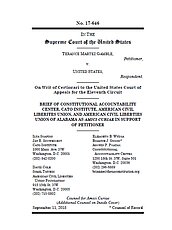Learn more about Cato’s Amicus Briefs Program.
The Double Jeopardy Clause of the Fifth Amendment prohibits any person from being “twice put in jeopardy of life or limb” for the “same offense.” The plain text of the amendment makes the protection specific to the person and the offense — not the entity doing the prosecuting. Yet in a series of atextual, ahistoric opinions, the Supreme Court concocted the so-called “dual sovereignty exception” (or “separate sovereigns” exception) to the Double Jeopardy Clause. This doctrine permits individuals to be subject to multiple prosecutions for the same offense (in contravention of the plain language of the Fifth Amendment), so long as different sovereigns are doing the prosecuting — generally, that means the federal government and one or more states.
Terance Gamble was subject to exactly this sort of double prosecution. First, he was convicted in Alabama state court for being a felon in possession of a firearm, and he served a one-year sentence. But the federal government, through the Alabama U.S. Attorney’s Office, then charged Gamble with being a felon in possession of a firearm under federal law for the very same conduct giving rise to his state conviction. Because the Supreme Court has created an end-run around the Fifth Amendment, Gamble was sentenced to spend an additional three years of his life behind bars.
Fortunately, the Supreme Court has agreed to hear Mr. Gamble’s case, on the straightforward question of “[w]hether the Court should overrule the ‘separate sovereigns’ exception to the Double Jeopardy Clause.” This is, frankly, a no brainer. As argued in the amicus brief filed jointly by Cato, the Constitutional Accountability Center, and the ACLU, the dual-sovereignty exception is inconsistent with the text, history, and structure of the Fifth Amendment, and flatly inconsistent with more recent developments in constitutional doctrine (most notably, the incorporation of the Double Jeopardy Clause against the states). Justices Thomas and Ginsburg alike have explicitly called upon the Court to reconsider the doctrine, which is always an encouraging sign. The time has finally come for the Supreme Court to correct this egregious mistake, and to ensure that criminal defendants receive the protection against multiple prosecutions that the Fifth Amendment so plainly commands.
